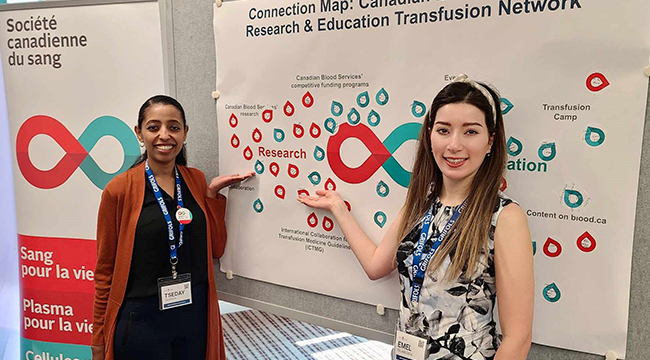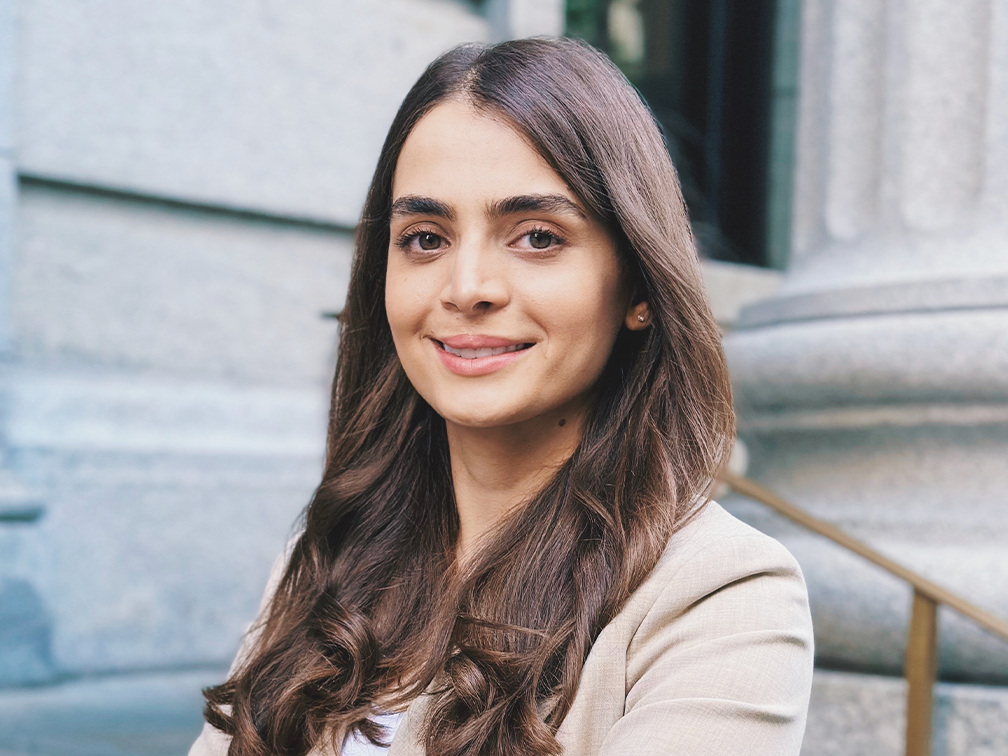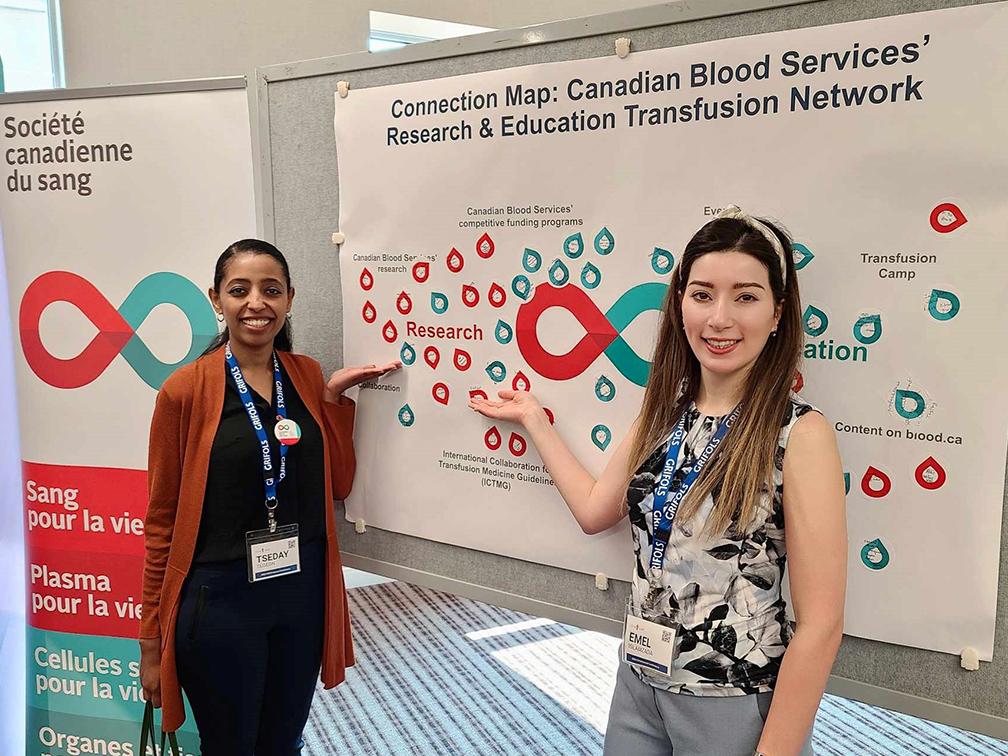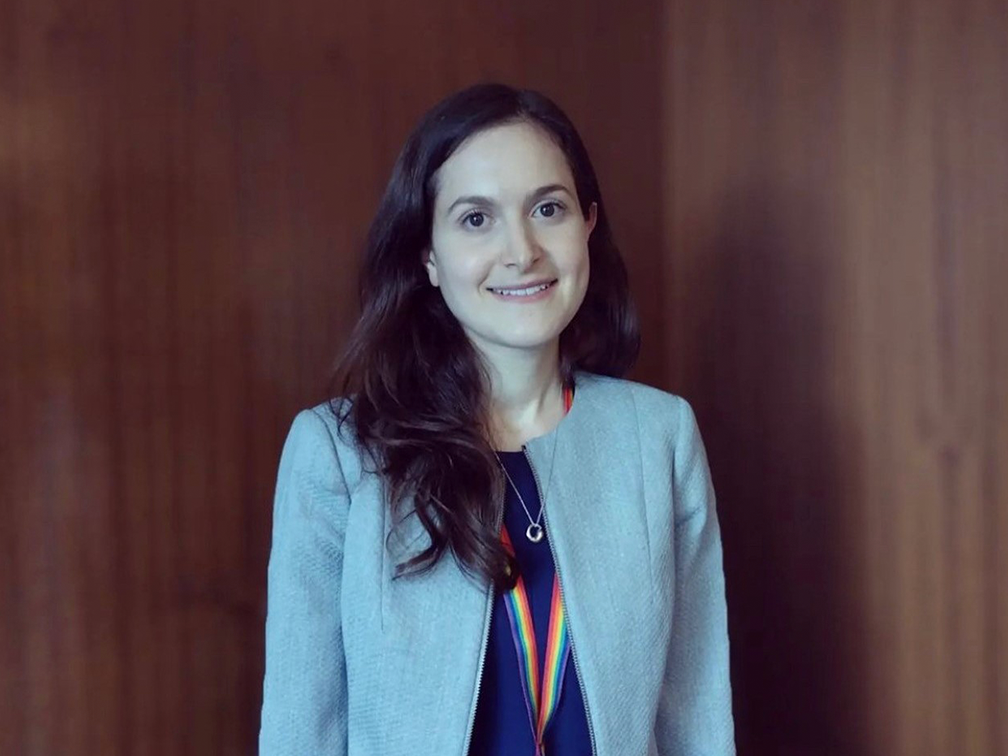CSTM 2023: Reflections from Canadian Blood Services research and physician trainees in transfusion medicine

This post compiles responses from Canadian Blood Services research trainees Melika Loriamini, Mahsa Yazdanbakhsh, Tseday Tegegn, and Emel Islamzada, along with those of Dr. Sheharyar Raza and Dr. Lianne Rotin, 2023 recipients of the Elianna Saidenberg Transfusion Medicine Traineeship Award. Responses have been edited for length and/or clarity.
CSTM 2023, the annual conference of the Canadian Society for Transfusion Medicine held in partnership with Canadian Blood Services and Héma-Québec, took place May 25–28 in Montreal. Research Day, also an annual event hosted by Canadian Blood Services that coincides with CSTM, took place on May 25 and provided a chance for the extended research network of Canadian Blood Services to collaborate, share their research, and network. Following these events, we asked Canadian Blood Services research and physician trainees to reflect on their experiences and key learnings from the event. Read on for their perspectives!
Melika Loriamini, PhD candidate in Dr. Donald Branch’s lab at the Li Ka Shing Knowledge Institute of St. Michael’s Hospital in Toronto
Melika is a recipient of funding through the Canadian Blood Services Graduate Fellowship Program and 2023 Travel Bursary Program.
- What were you most looking forward to about CSTM 2023?
This was my second time attending CSTM as I had also attended in Toronto in 2022. This year, I was most looking forward to learning about new research and technologies in both clinical and research settings.
- Did you share your research findings at the conference?
I shared a trainee rapid presentation at Research Day as well as an oral presentation during the session about Canadian Blood Services and Héma-Québec research updates on May 26 called “Drug discovery for inhibitors of phagocytosis for use in immune cytopenias.” With this research, I was able to discover two new drugs that can be used to treat patients with immune cytopenia.
- How do you think your experience at CSTM will impact your future career?
After presenting, I received valuable advice for my next steps and planned my subsequent experiment accordingly. Networking has also proven to be a valuable tool in facilitating communication with individuals from diverse fields of research, helping me to expand my professional connections.
- How has the support of Canadian Blood Services’ funding, resources and/or research network been valuable to you and your career?
Without Canadian Blood Services funding, I would not have been able to begin my project, and without the travel bursary, I might not have been able to travel and present and share my findings with great scientists. I express deep appreciation to my supervisor, Dr. Donald Branch. I never hesitate to ask questions – even simple ones – because he is very supportive. His lab has a great friendly environment, and the members are supportive!
Mahsa Yazdanbakhsh, PhD student in Dr. Jason Acker’s lab at the University of Alberta in Edmonton

Mahsa is a recipient of funding through the Canadian Blood Services Graduate Fellowship Program and 2023 Travel Bursary Program.
- What were you most looking forward to about CSTM 2023?
This was my second experience attending the CSTM conference. I was most looking forward to expanding my network and gaining insights into ongoing research in the transfusion field and considering joining professional associations. Conferences like CSTM provide opportunities to connect with experts, learn about the latest advancements, and exchange knowledge with peers.
- Did you share your research findings at the conference?
I completed a trainee rapid presentation at Research Day and an oral presentation in the clinical session on May 27 titled “Titration of adult red cell concentrates (RCCs) reduces the oxygen affinity of cord blood from preterm infants.” What got me interested in this research project was the chance to make a positive impact on the care of preterm infants. It's all about finding ways to optimize oxygen delivery to these little ones and the interdisciplinary nature of this research brings together transfusion medicine, neonatology, and hematology.
I'm passionate about making a difference in the lives of preterm infants and contributing to the field of transfusion medicine in a meaningful way!
- How do you think your experience at CSTM will impact your future career?
Presenting at the conference was awesome for my research – I learned so much from the audiences’ questions and recommendations. The feedback made me think about my work in new ways, consider different approaches and it has inspired me for future research.
I also learned a ton about the latest research in transfusion medicine and made important connections with experts in the field. Overall, it was a really valuable experience that has given me a fresh perspective and a boost of confidence in pursuing new opportunities!
- How has the support of Canadian Blood Services’ funding, resources and/or research network been valuable to you and your career?
This fellowship from Canadian Blood Services has made my PhD in the field of transfusion medicine possible. By providing essential funding, it has enabled me to pursue my research, cover scientific travels, and connect with experts in the field. Without this support, my PhD journey would not have been feasible, and I am grateful for the opportunity it has given me to contribute to the advancement of knowledge in blood transfusion!
Tseday Tegegn, PhD candidate in Dr. Ed Pryzdial’s lab at the University of British Columbia in Vancouver
Tseday is a recipient of funding through the Canadian Blood Services Graduate Fellowship Program and 2023 Travel Bursary Program.
- What were you most looking forward to about CSTM 2023?
This was my first time attending CSTM and visiting a city in the eastern part of Canada! I was most looking forward to presenting my research to the Canadian Blood Services community and learning about different areas of research that are going on in other labs across the country.
- Did you share your research findings at the conference?
I completed a rapid presentation and an oral presentation titled “Mechanism of dengue virus-induced thrombocytopenia: Virus-encoded non-structural protein 1 is expressed on the infected megakaryocyte and platelet surface.” My research covers broad interdisciplinary areas consisting of virology, biology, blood coagulation, and transfusion.
My research topic focuses on a particular process that can contribute to dengue virus-induced low platelet count which often disrupts normal blood clotting. After hearing my presentation, I hope attendees learned about dengue virus and how our lab investigates its most common clinical symptom called thrombocytopenia, which is a significant reduction of platelet number.
- How do you think your experience at CSTM will impact your future career?
By presenting, I benefitted from discussions with other scientists, nurses and clinical staff that asked questions about my research topic. One oral presenter had a similar topic as mine, so that sparked a lot of discussion and exchange of knowledge!
- How has the support of Canadian Blood Services’ funding, resources and/or research network been valuable to you and your career?
Receiving funding from Canadian Blood Services helped me pursue research and I am grateful that it contributed to my graduate school endeavor.

During CSTM 2023, Canadian Blood Services welcomed attendees to participate in a connection map activity that used stickers to depict the many benefits received and contributions made by members of the research and education transfusion network. Tseday Tegegn and Emel Islamzada pose in front of the map after adding stickers representing their research.
Emel Islamzada, PhD candidate in Dr. Hongshen Ma’s lab at the Centre for Blood Research at the University of British Columbia in Vancouver
Emel is a recipient of funding through the Canadian Blood Services Graduate Fellowship Program and 2023 Travel Bursary Program.
- What were you most looking forward to about CSTM 2023?
This was my first time attending CSTM and there were a few things I was looking forward to! First, I was excited to learn about the latest research advances by Canadian transfusion medicine experts. There is a lot of research I read from Canadian Blood Services researchers (including the Acker lab, Branch lab, Sheffield lab, to name a few) and it was wonderful to meet the researchers and their teams in person to talk about their work. I also had some protocol and technique-related questions I got a chance to talk to presenters about, which was very helpful in my own team’s research. Finally, I was looking forward to the networking and collaboration opportunities, which is especially important for me as I am preparing to defend.
- Did you share your research findings at the conference?
I did not present this year, unfortunately, as I was still working through the pile of experimental data at the time! The conference was a wonderful experience that I hope to attend again in 2024.
- How do you think your experience at CSTM will impact your future career?
I am very grateful for the wonderful talks that gave me so much inspiration for potential research directions in the future as I do hope to stay on in academic research. There were also a lot of current issues discussed, and it was great learning what other work is being done, networking and collaborating. I believe the conference helped me to be more prepared for an important future step in my career.
- How has the support of Canadian Blood Services’ funding, resources and/or research network been valuable to you and your career?
Receiving a Canadian Blood Services Graduate Fellowship Award supported me to jump-start my career in research. Additionally, the networking opportunities, opportunities to showcase our team’s research, and additional learnings outside of research that have been facilitated (such as sitting in for grant panels and contributing to knowledge translation blog posts) have been such a delight. I am honored and very happy to be supported by Canadian Blood Services’ Graduate Fellowship Program!
Dr. Raza Sheharyar
Dr. Sheharyar is a hematology resident at the University of Toronto and an incoming transfusion medicine physician trainee with Canadian Blood Services who has received the Elianna Saidenberg Transfusion Medicine Traineeship Award in 2023.
- What were you most looking forward to about CSTM 2023?
This was my second time at CSTM as I attended the conference in Toronto in 2022. I love our transfusion medicine community, which is full of curious, collegial, and creative folks with a passion for transfusion. This year, I most looked forward to meeting my friends from across the country and making new ones.
- Did you share your research findings at the conference?
I completed an oral presentation titled “GADGET: From data science to decision-making.” Feedback on my CSTM talk was encouraging because it provided reassurance that I was trying to solve problems people in our field care about. I have a background in neuroscience (undergraduate) and big data research (medical school) and believe they can be synthesized powerfully to solve problems.
I want to use data to study human behavior and change it for the better. In the transfusion context, this can have application from vein-to-vein by encouraging blood donation, minimizing blood processing errors, encouraging appropriate transfusion, and designing thoughtful ways of auditing this pathway for improvement.
- As a recipient of the Elianna Saidenberg Transfusion Medicine Traineeship Award, would you like to share any comments about what you are most eager to learn as you begin your fellowship in July?
I feel incredibly grateful to have received this award, which I believe will greatly amplify my contributions to the transfusion medicine field. Although I am truly looking forward to all aspects of transfusion medicine, I am particularly interested in learning more about how blood providers such as Canadian Blood Services and Héma-Québec function as organizations and as paradigms for how the broader healthcare system may be structured more efficiently.
Dr. Lianne Rotin

Dr. Rotin is a fifth-year resident in adult hematology at the University of Toronto and an incoming transfusion medicine physician trainee with Canadian Blood Services who has received the Elianna Saidenberg Transfusion Medicine Traineeship Award in 2023.
- What were you most looking forward to about CSTM 2023?
This was my first time attending CSTM and it was a fantastic experience! I was most looking forward to meeting and learning from other transfusion medicine experts across the country and receiving feedback on my research project.
- Did you share your research findings at the conference?
I shared an oral presentation titled “RBC alloimmunization risk following transfusion in immune checkpoint inhibitor therapy patients” during the plenary (Top 2) abstracts session. These days, many patients with cancer are being treated with immune checkpoint inhibitor drugs. This class of medications is known to cause non-specific activation of the immune system, but we do not know whether these drugs increase the rate of red blood cell alloimmunization in this population. As cancer patients are among the most frequent users of transfusion, it is important to know whether their risk of alloimmunization is increased so that we can take steps to reduce this risk.
- As a recipient of the Elianna Saidenberg Transfusion Medicine Traineeship Award, would you like to share any comments about what you are most eager to learn as you begin your fellowship in July?
I am thrilled to be starting my transfusion medicine fellowship in July 2023. I am most eager to build upon my immunohematology knowledge and skills over the next 2 years.
Supporting trainees
Canadian Blood Services’ Graduate Fellowship Program is a competitive program that provides stipend support for young investigators in the field of transfusion science. The Elianna Saidenberg Transfusion Medicine Traineeship Award is a competitive award that provides funding to trainees with the objective of building a community of experts that will ensure the relevance and safety of the blood system for years to come.
Canadian Blood Services – Driving world-class innovation
Through discovery, development and applied research, Canadian Blood Services drives world-class innovation in blood transfusion, cellular therapy and transplantation—bringing clarity and insight to an increasingly complex healthcare future. Our dedicated research team and extended network of partners engage in exploratory and applied research to create new knowledge, inform and enhance best practices, contribute to the development of new services and technologies, and build capacity through training and collaboration. Find out more about our research impact.
The opinions reflected in this post are those of the author and do not necessarily reflect the opinions of Canadian Blood Services nor do they reflect the views of Health Canada or any other funding agency.